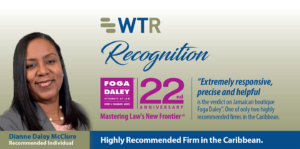
Intellectual Property Partner | Foga Daley
The Trade Marks (Amendment) Act (2013), which took effect on August 31, 2013, updated the Jamaica’s Trade Marks Act and Rules in several respects including changes in relation to opposition and revocation proceedings, the rights of an earlier user, registration of security interests and the assignability of trademark applications.
Changes in Opposition Proceedings
Prior to the amendments, an applicant had a non-extendable period of two months from the date of receipt of a Notice and Statement of Grounds of Opposition within which to file a counterstatement. This two-month period can now be extended. The potential opponent must seek the extension prior to the expiration of the initial two months outlining the reasons for requiring the extension.
Cooling-off Period
An applicant used to have only two months within which to file his Counterstatement once the Opposition (Notice & Grounds) had been filed and served upon him/representative. However, the 2013 Amendments allow parties to agree to a further two months, known as the “cooling-off period” to facilitate settlement discussions. Further extensions of the cooling-off period for up to six (6) months after the expiration of the initial two-month period are allowed provided the opponent agrees.
The Rules state that the applicant has one month from the expiration of the cooling off period within which to file his Counterstatement failing which the application is deemed to be withdrawn. However, based on the general rules related to extensions, parties can still apply for extensions of time beyond this 6 month-period, once the opponent consents. The granting of such extensions is within the discretion of the Registrar. If further extensions are granted and no counterstatement is filed by the final deadline outlined by the Registrar the application will be deemed to be withdrawn.
Changes in Revocation Proceedings
Prior to the 2013 amendments, a trademark registration was vulnerable to revocation if the mark was not used in Jamaica by the proprietor, or with the proprietor’s consent (in respect of the goods/services covered by the registration), within three (3) years after the date of completion of the registration procedure and up to one month before the date of an application for revocation, and there were no proper reasons for non-use.
That period is now five (5) years, which, based on the amended wording of the Trade Marks Act, is counted retrospectively from the date of the application for revocation and not as at the date of completion of the registration procedure.
A mark can also be revoked if use of the mark has been suspended for a continuous period of five (5) years prior to the date of an application for revocation and there are no proper reasons put forward by the proprietor for its disuse. Use for the purposes of challenging a revocation proceeding must be ‘bona fide use’.
Marks which are likely to deceive or confuse the public as to the nature, quality or geographical origin of the goods or services for which they are registered are also subject to revocation under the 2013 Amendment Act.
Extensions of Time Generally
The 2013 Amendments have made it possible to obtain an extension of time for certain matters which previously had to be done by a fixed non-extendable deadline, including filing an Opposition and Counterstatement, as mentioned above. Further, whereas it was only the parties concerned that could request an extension, an extension may also be granted purely on the initiative of the Registrar.
Preservation of rights of an earlier user
The 2013 amendments preclude a registered proprietor from restraining or interfering with anyone’s use of an identical or very similar unregistered trademark in relation to identical or very similar goods/services, provided the person has continuously used the mark and began using it before the registered proprietor’s mark was used or registered (whichever was earlier). The registered proprietor also cannot object to the earlier user’s later application for registration of the mark in respect of those goods/services.
Trade Mark Applications are Property
A trademark application confers a property right on the applicant and is consequently transmissible by assignment, will or operation of law in the same way as other personal or moveable property and can be so transmitted either in connection with the goodwill of a business or otherwise. The application may also be the subject of a charge in the same way as a registered trademark and other personal or moveable property. Previously, a trademark application was not assignable. One had to wait until the trademark was registered before assigning the mark.
Security Interests
The Trade Mark Office no longer has jurisdiction for the registration of grants of security interests over registered trademarks as this is the purview of the Security Interests and Personal Property, 2013 which established a new Securities Registry.
Subsequent Changes
JIPO Practice Re Class Headings
On February 4, 2015, the Jamaica Intellectual Property Office (JIPO) issued a Practice Notice indicating that it would no longer accept Class Headings. JIPO will only accept applications that list the specific goods or services which the applicant uses or intends to use under the mark.
Upon examination of a trademark application form JIPO will reject class headings and require applicants to list specific goods and/or services for which protection is sought. In those circumstances applicants will be required to submit their amended list of goods and/or services on the appropriate form along with the applicable fee.




